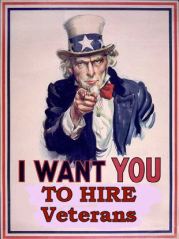
dod
The news is so full of the travails of veterans, that I thought it would be a breath of fresh air of to focus on the successes of some of us—and how to translate that into the success of all.
I went to the promotion of a colleague last week, at the new and gorgeous Fort Belvoir Army hospital in Virginia just south of the capital, and saw many old friends. Most had successfully “retired” into the ranks of the civilian work force.
By and large, they are doing just fine. Many work for contractors. Some work for the Defense Department or another government agency. Others serve with charitable organizations. They all appear committed to continue serving service members.
NPR had a great piece by Larry Abramson last week about how many folks who entered the service found it a way to the American dream.
I am writing this not to dismiss the problems faced by veterans seeking work. That has been a central theme of my posts. But the missing link is how to highlight some of the successes of my fellow highly-trained veteran professionals, and how we can jumpstart that into helping many more.
I want to advocate that we — the professional veteran community. to the extent that one exists — need to harness the employed military veterans to help those who have not yet found careers.
There have been initiatives in this direction, including the White House’s Joining Forces and the SAMHSA Policy Academy. I recently gave a talk at Northrop-Grumman, which has focused on this area. The discussion included how to aid the veterans in the transition process.
But there does not seem to be a concerted, nationwide effort to connect new veterans with employed “professional” veterans,
How do we change that?
Many veterans work in federal agencies. Where is the list of who recently-discharged service personnel should call when they need a mentor? I now work for the District of Columbia government, but I have no idea how many other vets work there, or who they are. I know I am not alone; most – all? — states lack such rosters.
So, let’s hire veterans. But let’s also build a network of successful veterans, who have made it into the civilian world, that can help those hanging up their uniforms today, and tomorrow. It’s good for the troops, good for the vets, and good for business.


